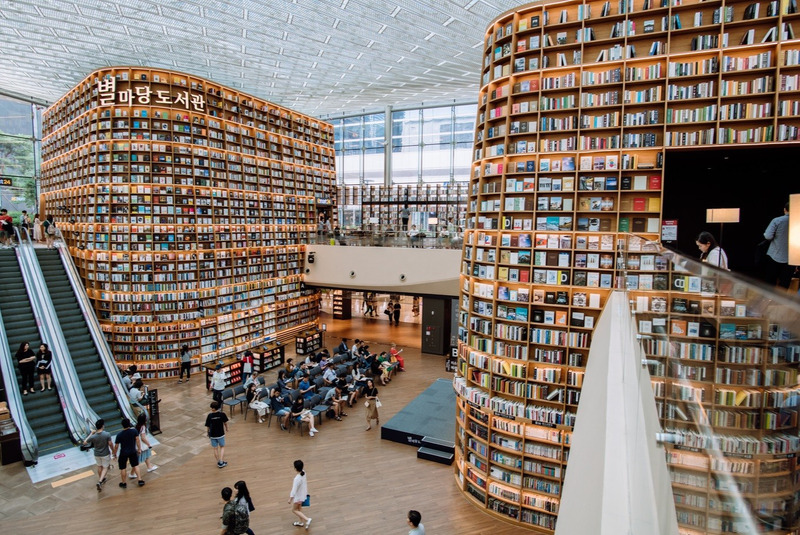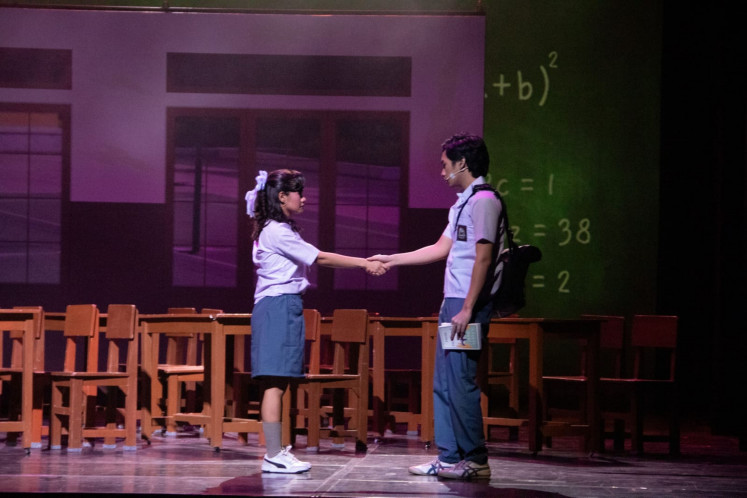Popular Reads
Top Results
Can't find what you're looking for?
View all search resultsPopular Reads
Top Results
Can't find what you're looking for?
View all search resultsK-drama's obsession over books and literature: Five hidden gems
These are some K-dramas that have hidden gems for book lovers.
Change text size
Gift Premium Articles
to Anyone
A
part from the success of The Handmaid’s Tale, a drama series adapted from a dystopian novel of the same name by Canadian author Margaret Atwood, American TV series have always shown an interesting relationship with literature. Breaking Bad, a highly successful TV series from 2008 to 2013, includes Walt Whitman’s poetry as part of the plot and one of its episodes was called “Kafkaesque”. In it the characters experience a situation that is similar to the worlds in Franz Kafka’s literary works. Another TV series even developed a character based on American poet Edgar Allan Poe and made various adaptations from Poe’s stories.
Such references are common in Western TV series, but you might be surprised to see them in your favorite K-drama.
Korean drama, more popularly known as K-drama, is on the rise. The stories, actors and cinematography are so mesmerizing, you cannot help but binge-watch series after series.
However, no matter how captivating the conflicts between characters and the beauty of the actors, one cannot possibly miss some hidden and not-so-hidden references to literature that have made their way into the scenes. They are parts of the plot, as a means for character development, or describe the relations between characters.
These are some K-dramas that have hidden gems for book lovers:
Mother (2017)
Mother is an adaptation from a Japanese TV series of the same name. It tells the story of a school teacher who desperately tries to help an 8-year-old student escape her abusive mother, but ended up being charged for kidnapping. Both the Japanese and the Korean versions focus on the relationship between the mother and daughter.
The Korean version arguably portrays the relationship better by including a children's book, The Runaway Bunny, as part of the characters' journey as non-blood-related mother and daughter. The story of the little bunny who tries to run away but is always chased by her mother is told over and over, episode by episode. The child character was shown reading the book in the Korean translation countless times. The word domang (runaway) will stay in your ears for days, weeks, even months after you finish watching it.
My Absolute Boyfriend (2019)
This drama is also an adaptation of a Japanese TV series with the same title. With a robot as the main character, some features shown in this drama might remind you of HBO’s Westworld.
The story evolved around the existence of a robot identified as Zero 9. Created specifically as a dating robot, Zero 9 supposed to show unconditional love to his customer/girlfriend. But his programmer was too affectionate, he read out Oscar Wilde’s The Happy Prince over and over during the robot’s development and reminded Zero 9 to never end up like the character in the book. “Don’t just give love,” he said. “You must be loved, too,” fearing the robot would end up in a dumpster after giving out all his love like the Happy Prince did.
Hotel del Luna (2019)
Probably the most successful K-drama in 2019, Hotel del Luna tells the story of a woman who is stuck in the world for nearly 1,000 years. Her existence is not bound by time but deeply rooted in a sin from the past. She continues living from ancient Korea to the Joseon era, on and on until modern Korea. She stays in the living world but is not actually alive; nor can she die and make her way to the afterlife. She remains in the living world as a hotel owner, not an ordinary hotel but one that is specially built for ghosts: a shelter before they enter the afterlife.
As she sent her guests to cross the bridge into the afterlife, the main character reflects on her existence as a being detached from time. This TV series is ahead in the game. Its reference to Sein und Zeit by Martin Heidegger is so subtle but it constitutes the whole universe of the drama. No one reads out any line from the book in any scene and the book is only shown in two of 16 episodes in the series, but it is probably the muse of the story.
Romance Is a Bonus Book (2019)
Romance Is a Bonus Book is a special one. The series depicts the lives of Korean book publishers and their struggle to produce great books: How they carefully handle a manuscript that is still written in longhand, how they convince writers in doubt, their frustration in designing book covers and creating the suitable marketing strategy for each book, their joy when some of their months or years of effort hit the bookstores and become bestsellers and their sorrow when they have to witness 1,000 copies end up in a warehouse, getting shredded into pieces for recycling.
Just like the title, the romance is just a bonus. One memorable moment from the series is its reference to the Japanese’s expression for “I love you”. Japanese novelist Natsume Sasoki once pointed out to his student that it is not common for Japanese to say “I love you”. He suggested instead to use “Tsuki ga kirei desu ne” (The moon is beautiful isn’t it?).
Books, literature and poems add a certain value to K-drama series. For the readers, it may be amusing to find their favorite book on the silver screen. For those who have not read it, they may feel intrigued and may end up searching it out in a bookstore. For those who have never read it and don’t have an immense interest in literature, the reference still gives out a warm feeling when reflected in the character’s emotions.
Whatever the case, one may hope more references are made in such productions since people currently spend more time in front of a screen than reading books. Hopefully, an original Indonesian production will follow this path. (kes)
***
Marlina Sopiana is a freelance translator. She writes and edits for Galeri Buku Jakarta. Marlina recently published a collaborative book on writing, Memikirkan Kata.











